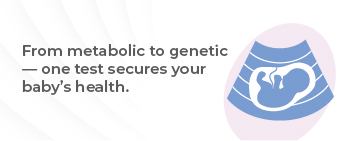Frequently Asked Questions
The panel you choose determines the scope of testing. The basic option screens for 7 common conditions, including phenylketonuria and congenital hyperthyroidism. Broader panels, such as TMS and GCMS, screen for 50 to over 100 disorders. These tests detect congenital disorders and birth defects that may not be visible at birth but could affect your baby’s growth and development later.
Doctors usually recommend newborn screening within the first 48 hours to 5 days after birth. This timing ensures that conditions, which do not appear immediately, can still be detected in the baby’s blood. If the hospital does not perform the test, parents should schedule it within the first week.
The panel you choose decides the list of conditions. The Newborn Screening Basic panel screens for 7 conditions, including phenylketonuria, hyperthyroidism, and galactosemia. Advanced panels, like the GCMS, screen for over 100 disorders, including metabolic, fatty acid metabolism, peroxisomal, and amino acid metabolism.
The cost of newborn screening tests in India varies depending on the panel. The Newborn Screening 11 Conditions panel costs around ₹2,500. Panels like TMS 59 and TMS 62, which screen for 50+ conditions cost around ₹4,400–5,000. The most comprehensive Newborn Screening GCMS panel, screens for over 100 conditions and also costs ₹4,400. Genetic sequencing options are priced at around ₹20,000.
Yes, many labs and health services offer home collection, especially in big cities. Check with the provider when you book a test, as some include it for free while others charge a small fee. Lifecell Diagnostics is a reliable option for free home sample collection
You receive basic newborn screening reports within 48 hours. Panels like the TMS and GCMS that cover over 50+ conditions may take more time. However, on average, parents can expect results within 2 working days.
The best time to do a newborn screening is within the first two days after birth. By then, your baby has had a few feeds, which helps improve the accuracy of results. If there’s a delay, most providers can still screen effectively up to about a week after birth.
Yes, it is necessary to do a newborn screening. It helps detect serious but treatable conditions that usually don’t show symptoms right after birth. Some of these conditions include phenylketonuria, congenital hypothyroidism, galactosemia, etc. Screening ensures these conditions are detected early, giving your baby the best chance for timely treatment, healthy growth, and development.
The biggest benefit of early detection through newborn screening is that it allows doctors to find hidden health problems before symptoms appear. It can prevent permanent disabilities and serious complications in conditions like phenylketonuria, congenital hypothyroidism, or sickle cell anaemia. Starting treatment early gives babies a much better chance at healthy growth and development. It also reduces long-term healthcare costs and provides reassurance to families.
You do not need to do anything special to prepare for your baby’s newborn screening. The test is a quick heel prick. Feeding or holding your baby close during sample collection can help keep them calm.
Newborn screening is one of the important screenings usually done within the first 24-48 hrs (1-2 days old) after birth. This screening usually screens for the risk of serious but treatable health conditions, following up with diagnostic testing and continued evaluation. Though the disease occurrence is a 1:1000 ratio, identifying these at a very early stage can be a life-changing difference to parents and guide them on necessary care and lifestyle adjustments.
As the name indicates, the newborn screening test is performed after birth within 1-2 days (usually between 24-48 hours). Many conditions go undetected if the blood sample is taken before 24 hours, which necessitates a second screening.
Newborn screening is a simple and painless procedure. A healthcare provider collects a few drops of sample on a special paper using the heel prick method and sends it to the lab for further evaluation.
The diseases screened under the newborn screening program vary from country to country. However, it is used to diagnose inborn errors of metabolism early, which include various genetic disorders that can lead to developmental delays or life-threatening complications.
Yes, Newborn screening is a safe and painless procedure. The amount of blood collected is very small, far less than that could affect the baby in any way
No, Newborn screening cannot be performed at home. Usually, if parents opt for this screening, it is done before the discharge from the hospital.
As it is a screening, this test just identifies the risk of any inborn error of metabolism; if not diagnosed on time, it may lead to a life-threatening condition. However, this test does not confirm the presence of diseases. There is a chance of a false positive result, which requires a follow-up diagnostic test to confirm.
The newborn screening test report will be available within 5 to 7 days.
The cost of newborn screening tests price in India can vary depending on the number of conditions screened, the technology used, and the diagnostic provider. The good news is that newborn screening is generally affordable, especially when compared to the long-term cost of treating conditions detected late.
Newborn screening reports are meant to guide early care and support. Here’s how parents can understand and respond to each result category:
| Result Category | Also Called | What It Means |
|---|---|---|
| In-range | Negative, Normal, Low risk | The screening values are within the expected range. No signs of the screened conditions were detected. |
| Out-of-range | Positive, Abnormal, High risk | One or more values fall outside the normal range, suggesting a possible condition. |
| Borderline | Inconclusive, Medium risk | Results are not clearly normal or abnormal and may be influenced by timing or sample factors. |
So once the results are out, if you find any result as positive, do not panic, as there is a high chance of getting a false positive; consult your healthcare provider and follow up with a diagnosis.





